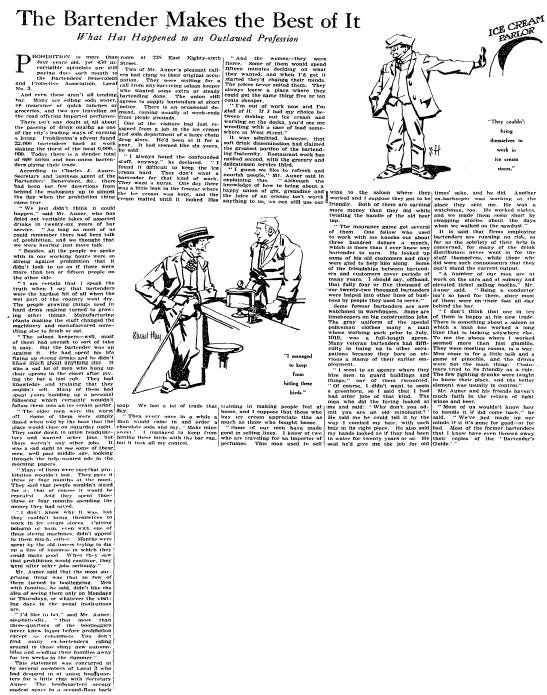The Bartender Makes the Best of It
What did former bartenders do once Prohibition outlawed their profession? A 1923 New York Times Magazine article revealed the top three new jobs: #1 "soft drink dissemination," #2 restaurants, #3 groceries and delis.
(Before the widespread adoption of vending machines later in the century, it used to require humans to dispense sodas.)
Charles J. Auner, secretary of a New York City's bartenders' union — Bartenders' Benevolent and Protective Association, Local No. 3 — noted that drink servers suffered worse from Prohibition than anybody else involved along the journey from grape to glass:
"I am certain that I speak the truth when I say that bartenders were the hardest hit of all when the wet part of the country went dry. The people growing things used in hard drink making turned to growing other things. Manufacturing plants making the stuff changed the machinery and manufactured something else to drink or eat.
...
But the bartender was up against it. He had spent his life fixing up strong drinks and he didn't know much about anything else. ... Many of them had spent years building up a personal following which certainly wouldn't follow them into an ice cream parlor.
That wasn't a hypothetical; some of them did indeed begin working in ice cream parlors. The article quotes an anonymous former bartender who pivoted to ice cream, but complained about the customer behavior compared to the essentially all-male clientele at the saloon:
"And the women — they were fierce. Some of them would spend fifteen minutes deciding on what they wanted, and when I'd get it started they'd change their minds."
Other former bartenders worked in warehouses, in construction, in insurance, in public transportation, or as ticket takers:
"A number of our men are at work on the cars and at subway and elevated ticket selling booths," Mr. Auner said. "Being a conductor isn't so hard for them, since most of them were on their feet all day behind the bar."
Ultimately, few preferred their new jobs over their old ones, Auner continued:
"I don't think that one in ten of them is happy at his new trade. There is something about a saloon in which a man has worked a long time that is lacking anywhere else. To me, the places where I worked seemed more than just ginmills. They were meeting rooms, in a way."
An unanswered question: when Prohibition was ultimately repealed in 1933, did most former bartenders return to their prior profession, or did they remain in their field? After all, it had been more than a dozen years since they'd last bartended at that point.
If anybody knows the answer, please leave it in the comments.
The Bartender Makes the Best of It
Published: Sunday, August 19, 1923


